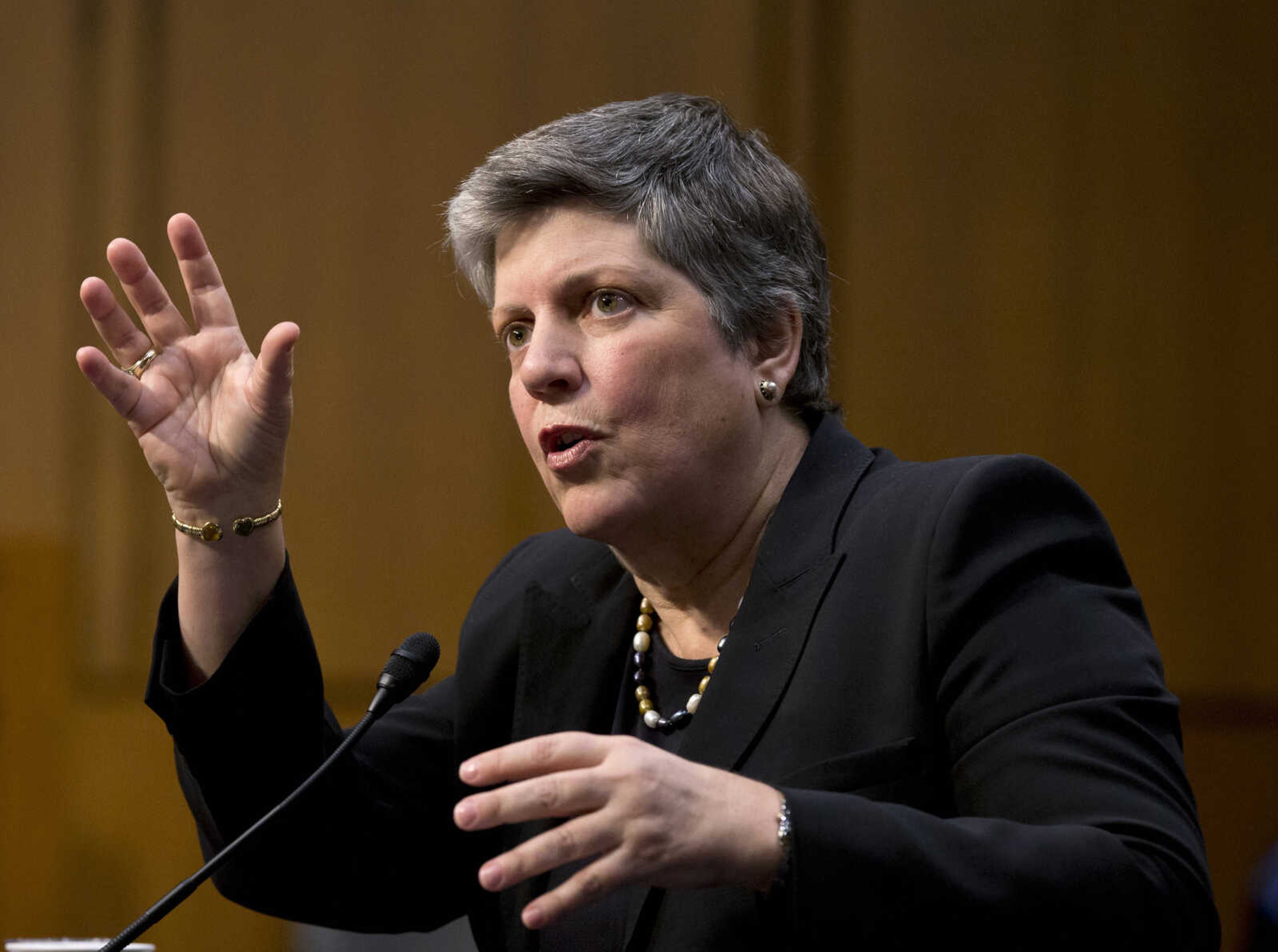Napolitano: Immigration bill would boost security
WASHINGTON -- Sweeping immigration legislation would improve U.S. security by helping authorities to know who is in the country, Homeland Security Secretary Janet Napolitano said Tuesday, as supporters of an immigration overhaul marshaled arguments against opponents trying to slow it down in the wake of the Boston Marathon bombings...
WASHINGTON -- Sweeping immigration legislation would improve U.S. security by helping authorities to know who is in the country, Homeland Security Secretary Janet Napolitano said Tuesday, as supporters of an immigration overhaul marshaled arguments against opponents trying to slow it down in the wake of the Boston Marathon bombings.
Testifying at a Senate Judiciary Committee hearing, Napolitano said a wide-ranging bill circulating in Congress devotes more money to securing the border, requires employers to verify their workers' identity and implements new systems to track people as they leave the country -- something that might have helped flag when one of the suspected Boston bombers traveled to Russia last year. Of great importance, Napolitano said, is the eventual path to citizenship for the 11 million immigrants here illegally.
Republicans have criticized such a path as a divisive proposal that rewards lawbreakers. But Napolitano said it is a fundamental tool to help law enforcement authorities know who is in the United States.

"One of the real significant improvements made by this bill is to bring people out of the shadows," she said. "We know who they are. We know where they are. And by the way, from a police perspective, once these people know that every time they interact with law enforcement they won't be subject to removal, it will help with the reporting of crimes, the willingness to be a witness and so forth."
Napolitano's support for legislation that's a top second-term priority for President Barack Obama was no surprise. While in the past she has criticized the idea of making a path to citizenship conditional on accomplishing border security goals first -- as the new bill does -- Napolitano didn't repeat that criticism Tuesday. Instead she said the border security "triggers" in the bill are achievable, suggesting they wouldn't loom as major impediments to citizenship.
Napolitano's testimony came as last week's Boston Marathon bombings have clouded the introduction of the landmark immigration legislation, with Republicans suggesting it should be slowed down or revisited until more is known about any loopholes in the immigration system the Boston bombers may have exploited, or national security flaws that should be addressed in the bill.
So far, there's no indication the two suspected bombers, brothers of Chechen origin, violated U.S. immigration laws. They came legally about a decade ago when their family sought asylum, and both became legal permanent residents while one eventually attained U.S. citizenship.
Napolitano defended the asylum system now in place, describing an extensive process with multiple screenings.
She said any asylum applicant is thoroughly interviewed and vetted, run through databases, fingerprinted and vetted again when they become eligible for a green card and ultimately citizenship.
Napolitano also said the process has improved in the past four years, and she said the new immigration bill would build on that.
The top committee Republican, Sen. Chuck Grassley, R-Iowa, raised concerns because the bill eliminates a requirement that people apply for asylum within a year of arriving in the country, and allows new applications from those whose cases have been unsuccessful because they didn't comply with the one-year bar to reapply.
Napolitano said nothing in the bill would weaken asylum procedures.
Authors of the bill including Sen. Chuck Schumer, D-N.Y., have said they're open to changes in the legislation should any issues come to light in the wake of the Boston situation, but so far there have been no flaws exposed in the immigration system that aren't already addressed in the bill. The FBI apparently missed a trip to Russia by one of the suspected Boston bombers last year because his name was misspelled on a travel document, but that would be fixed in the bill because passports would be swiped electronically, not entered manually as now happens, Schumer said.
Napolitano disclosed Tuesday that despite the misspelling, the Homeland Security Department had known of the Russia trip because of "redundancies" in the system, but she praised the new electronic entry-exist system proposed in the bill. "It really does a good job of getting human error, to the extent it exists, out of the process," she said.
Schumer and three other authors of the immigration bill sit on the Judiciary Committee, and they repeatedly elicited Napolitano's praise for security enhancements in the bill. She found less to agree on with some Republicans on the panel, who questioned her claims that border security had already been improved under the Obama administration and that the bill would do even more.
"I'm concerned that the bill we're discussing repeats the mistakes of the past and won't secure the border and stop the flow of illegal migration," said Grassley. He contended that the border security provisions in the bill don't amount to much because millions would get a provisional legal status once the Homeland Security Department has completed plans aimed at enhancing border security and fencing, even if the plans are flawed or inadequate.
"If enacted today, the bill would provide no pressure on this secretary or even any future secretary to secure the borders," Grassley contended.
Connect with the Southeast Missourian Newsroom:
For corrections to this story or other insights for the editor, click here. To submit a letter to the editor, click here. To learn about the Southeast Missourian’s AI Policy, click here.









